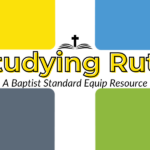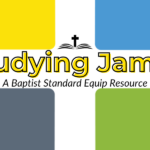Genesis has been at the heart of Baptist controversies for centuries.
From the “Toy Controversy” in which Crawford H. Toy—who has been dubbed the original “first Baptist martyr of modernism”—denied the Genesis creation account in favor of Darwinian evolution, to John Frank Norris and his battle with Baylor for teaching evolution in the classroom that prompted the Southern Baptist Convention to develop and adopt the Baptist Faith & Message 1925, Genesis repeatedly has sparked theological and institutional controversy.
More recently, the “Elliot Controversy” led to the publishing arm of the SBC pulling Ralph Elliot’s Broadman Bible Commentary on Genesis in the 1970s due to his nonliteral interpretation of the creation account.
These controversies highlight the enduring significance of Genesis for Baptists.
With that said, let’s embark on ways to understand Genesis on its terms without invoking controversies.
Genesis on its terms
Genesis is mythology. I know, a controversial statement, but let’s lower our Baptist swords for a moment and hear me out.
Genesis is a myth if one considers the historical definition of mythology as a story of origin that considers how the divine interacts with creation.
In the technical sense, Genesis is mythology. In the modern sense, I would argue, not so much.
However, I start with this point of Genesis as mythology to consider how it should be understood, especially in light of other mythologies of the ancient world.
Sign up for our weekly edition and get all our headlines in your inbox on Thursdays
This matters, because if one is going to understand Genesis on its terms, one has to get outside one’s contemporary bubble and begin to understand Genesis is a theological claim on the origins of the universe that is surrounded by other theological claims made alongside it by other people groups in the ancient world.
To do this, it is of the utmost importance readers of Scripture escape their chronological echo chamber when engaging with the text.
We all know what echo chambers are today in our polarized society. Unfortunately, not enough people are aware of the fact we read the text through modern-Western lenses that are difficult to take off.
However, escape is possible when one consults commentaries, hopefully examining theologians’ commentaries from different parts of church history.
Escaping Enlightenment influence
The reality is, we all are under the influence of Enlightenment thinking. The presuppositions of today have different nuances than pre-Enlightenment thinkers.
To combat this “reading under the influence,” I suggest consulting commentaries written by the early church fathers and the medieval doctors of theology. The fortunate thing is most of these commentaries are available online for free.
I often find myself consulting digitized libraries of early church writings such as Christian Classics Ethereal Library, Internet Archive, New Advent or Early Christian Commentary.
If I were to recommend one theologian from outside our contemporary bubble, it would be Augustine’s commentaries on Genesis.
It also is important to point out, by looking at these early church fathers, we not only find ourselves getting outside of our ideological silos, but we also are getting outside of our cultural paradigms, since most of the early church fathers came from a non-Western perspective.
The world of Genesis
When we enter into the world of Genesis, we come to see some of the literary features of the account on its own terms.
For example, we begin to see the “bi-focal” approach of Hebrew literature throughout Genesis. This is when the reader begins to see the Hebrew literary style of a two-fold telling of the story.
For example, one sees the first creation account in Genesis 1 as a macro understanding of creation, while the second account found in Genesis 2 is a micro account.
This example of the “bi-focal” method allows the reader to understand the Creator is both the transcendent Creator of the universe and yet at the same time, the immanent Creator of us. He is both the God of the “big picture” and the God of the “details.” He is the God beyond our understanding and yet at the same exact time, the God who relates to us personally.
Once you begin to notice this “bi-focal” reading, you will begin to see it throughout Genesis.
In fact, when I teach Genesis in my introductory Old Testament courses at Howard Payne University, I help my students see the two-fold structure of the entire book by breaking Genesis down into two parts: the primeval history of Genesis 1-11 and the ancestral history of Genesis 12-50.
Genesis gives us the origin story of the entire world and the origin story of a particular people.
Genesis alongside other origin stories
When one begins to understand Genesis on its terms, one will have a greater appreciation for the account itself, especially when one begins to read Genesis alongside other mythologies of the day.
In fact, reading some of the other myths actually will provide clarity for some of the more difficult passages in Genesis.
For example, when one compares the flood accounts of other people groups with Genesis, it provides a greater appreciation for the grace of God. The Gilgamesh Epic’s cause of the flood was because man was too noisy.
Or when one considers the story of Abraham almost sacrificing Isaac in light of the child sacrifice of the Canaanite god Molech, we cannot help ourselves but praise God that we do not have to give up our children to be in relationship with him because he does it on our behalf.
I hope this article challenges us to get outside of our bubbles so we can have a greater appreciation for the book of Genesis.
Other resources I have found helpful to understanding Genesis on its own terms follow.
Other resources
Christ-Centered Exposition Commentary: Exalting Jesus in Genesis by Phillip Bethancourt
This commentary is part of the Christ-Centered Exposition series, focusing on how Genesis reveals Christ throughout its narrative. Phillip Bethancourt, a Texas native, provides an accessible yet exegetically sound approach, making it useful for pastors, seminary students and lay leaders seeking to apply Genesis in a Christ-centered way.
The Bible Project: The Book of Genesis
This resource provides an accessible and visually engaging overview of Genesis, summarizing key themes, literary structure and theological insights. It is useful for introducing students or laypeople to Genesis in an approachable way. I appreciate the contributors’ use of typology in their resources.
A Theological Introduction to the Pentateuch by Charles A. Briggs and Richard E. Lohr
This book offers a theological and academic examination of the first five books of the Bible, making it a valuable resource for in-depth biblical studies and theological reflection on Genesis.
A Beautiful Design sermon series by Matt Chandler
This sermon series provides a pastoral and practical application of biblical themes related to human identity and creation, making it useful for sermon preparation or pastoral teaching. This series was extremely impactful on me as I was just starting out in ministry.
NIV Cultural Backgrounds Study Bible: Bringing to Life the Ancient World of Scripture edited by Craig Keener and John Walton
This study Bible provides historical, cultural and archaeological context, helping to illuminate the background of Genesis and other biblical texts. It is valuable for understanding how the ancient Near Eastern setting informs biblical interpretation. I used this study Bible for my own personal study for years.
Expositions of Holy Scripture: Genesis, Exodus, Leviticus, and Numbers by Alexander MacLaren
This is a classic pastoral exposition offering theological reflections and practical applications. While dated, it is useful for historical perspectives on Genesis interpretation. If you can get past MacLaren’s refusal to be pinned on a literal reading of Genesis, this can be a helpful resource.
A Biblical History of Israel by Iain Provan, V. Philips Long and Tremper Longman III
This book takes a critical and historical approach to the history of Israel, including the narratives in Genesis. It is useful for those studying the historical reliability and theological implications of the Old Testament. I used this resource in one of my Bible classes in seminary and have utilized it ever since.
Genesis in Space and Time: The Flow of Biblical History by Francis Schaeffer
Francis Schaeffer approaches Genesis from a theological and apologetic perspective, emphasizing its historical significance. It is useful for engaging with how Genesis interacts with history and contemporary faith discussions.
Free Bible Commentary: Genesis 1-11 and Genesis 12-50 by Bob Utley
Bob Utley provides free, accessible biblical commentary aimed at laypeople, pastors and teachers. It is helpful for sermon preparation and study groups. I utilize Utley’s free resources anytime I am handling a challenging text.
Biblical Critical Theory: How the Bible’s Unfolding Story Makes Sense of Modern Life and Culture by Christopher Watkin
This book engages with the Bible’s overarching narrative and its implications for contemporary culture. It is useful for integrating biblical themes with modern cultural analysis. This is probably one of the most impactful works I ever have read.
This is a monster of a work. So, if it seems too challenging for you, there is a layman’s version of this work called Strange New World by Watkin.
Jordan Villanueva is a graduate of Howard Payne University, where he is instructor of Christian studies in the School of Christian Studies and assistant to the president for Hispanic relations. The views expressed in this resource article are those of the author.
















We seek to connect God’s story and God’s people around the world. To learn more about God’s story, click here.
Send comments and feedback to Eric Black, our editor. For comments to be published, please specify “letter to the editor.” Maximum length for publication is 300 words.